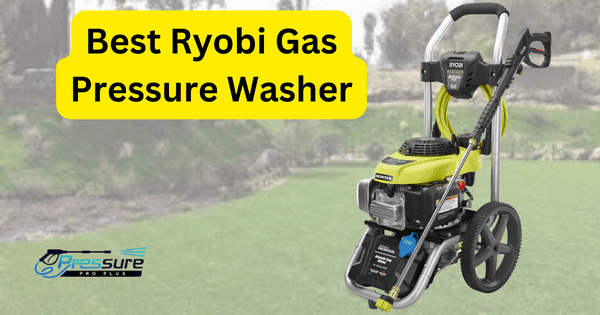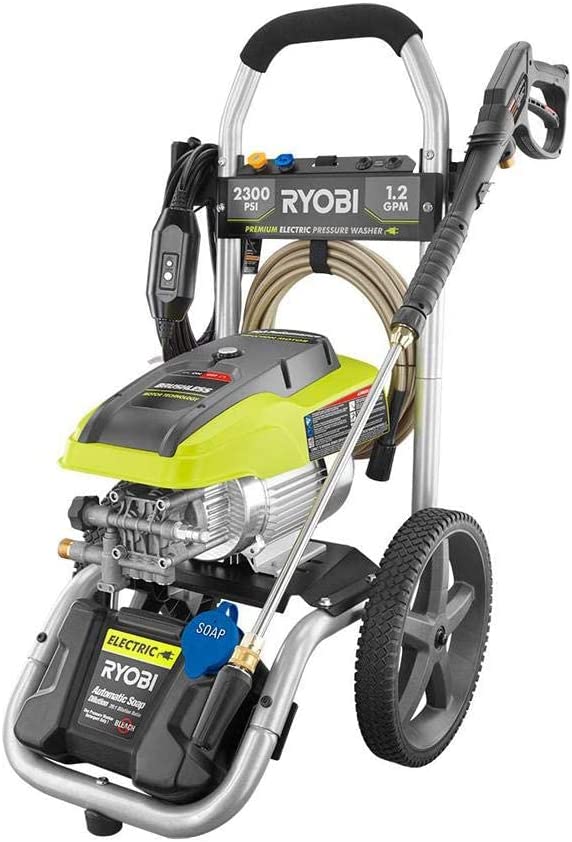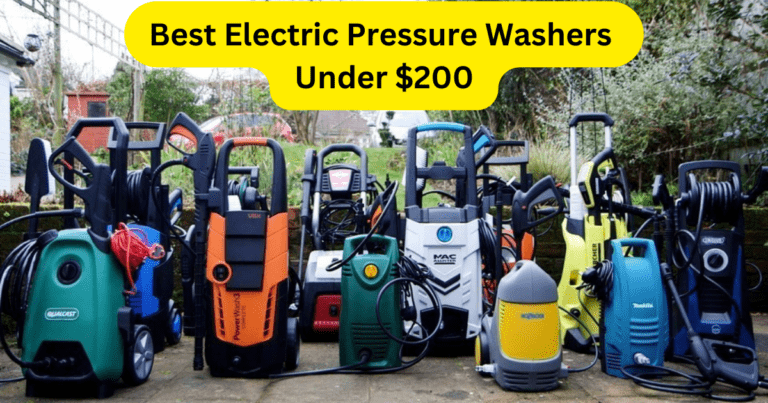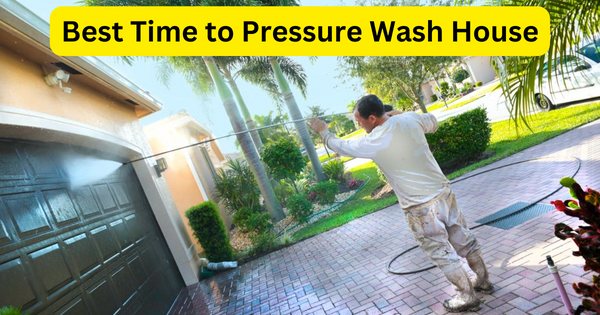Get ready to power up your outdoor cleaning game with the best Ryobi gas pressure washer! In this ultimate guide, we’ll show you how to choose, use, and maintain your pressure washer like a pro.
Table of Contents
Introduction
Ryobi gas pressure washers are a reliable and efficient solution for outdoor cleaning tasks. With their powerful motor and high-pressure water output, they can effortlessly blast dirt, grime, and stains from various surfaces. Owning a gas pressure washer can save time and effort in cleaning your driveways, decks, patios, and other outdoor areas. This book has all the details required to select the ideal Ryobi gas pressure washer for your requirements and advice on using and maintaining it to get the most use possible.
Ryobi’s We Recommended in This Guide
What to Consider Before Buying a Ryobi Gas Pressure Washer
There are several things to consider before purchasing a Ryobi gas pressure washer to make sure you pick the suitable model for your cleaning requirements.
First, you should look at the power output of the pressure washer. This refers to the motor’s horsepower and determines the unit’s overall cleaning power. A higher power output translates to higher cleaning efficiency, but it also means a more expensive team.
Water pressure is another essential factor to consider. It is measured in PSI (pounds per square inch) and determines how much force the water can exert when spraying. The higher the PSI, the more influential the pressure washer is in removing stubborn stains and dirt.
The pressure washer‘s flow rate is GPM (gallons per minute) and water delivery rate (gallons per minute). A pressure washer with a higher flow rate may clean more surface area quickly.
Nozzle options are also essential to consider. Different nozzle types are designed for various cleaning tasks, such as removing dirt, washing cars, or cleaning decks.
The hose length is another crucial factor, especially if you need to reach distant areas. A longer hose allows you to cover more ground without moving the pressure washer constantly.
Warranty and support are also essential considerations. You should check the manufacturer’s warranty and support policies to ensure that you are covered in case of defects or malfunctions.
Finally, consider the user-friendliness of the pressure washer. Look for features such as easy-to-adjust nozzles, a user-friendly control panel, and an ergonomic design for comfortable handling. You may select the best Ryobi gas pressure washer based on these criteria to suit your needs and budget.
You can also check Best Electric Pressure Washers Under $200 in 2023
Top Ryobi Gas Pressure Washers on The Market
Ryobi has a range of gas pressure washers that are popular in the market. Here are some of the top models you should consider before purchasing.
3100 PSI 2.3 GPM Cold Water Gas Pressure Washer
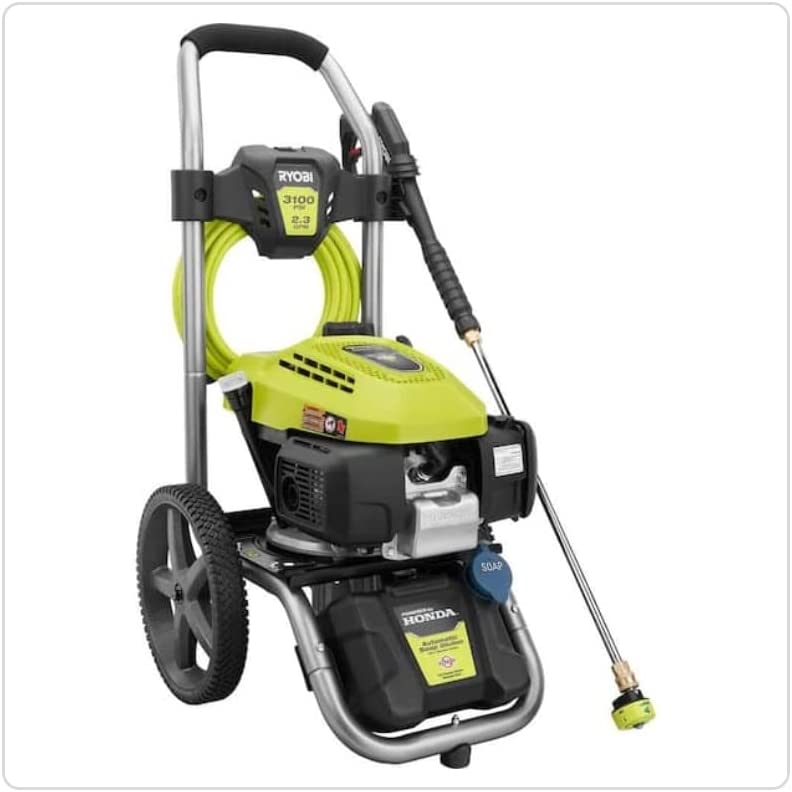
The Honda GCV170 167 cc premium gasoline engine of the RYOBI 3100 PSI Pressure Whttps://en.wikipedia.org/wiki/Pressure_washingasher produces 3100 PSI of force for rapidly cleaning driveways, decks, windows, and other places around the house. The engine is built to start quickly and consistently. The pressure washer is engineered to handle even the most demanding jobs. It is performance tested and rated following PWMA standards.
The pressure washer features a durable, compact frame design and large 12-in. flat-free wheels for easy transport. The 35 ft. non-marring high-pressure hose provides 40% longer reach for access to even the most challenging areas. Thanks to the onboard detergent tank, you can skip dragging a bucket and hose behind you for hassle-free cleaning.
The RYOBI 3100 PSI Pressure Washer comes with a 5-in-1 quick-change-over nozzle for varied cleaning for enhanced convenience. The RYOBI 3-year limited warranty and 2-year limited engine warranty ensure that the pressure washer will perform as expected for many years.
.
3300 PSI 2.5 GPM COLD WATER GAS PRESSURE WASHER
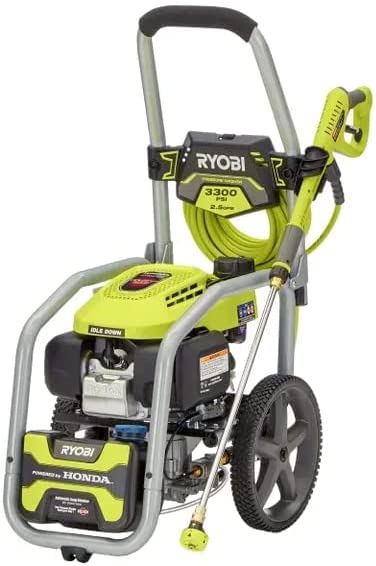
The RYOBI 3300 psi Pressure Washer is a powerful tool for handling tough cleaning jobs around your home. Its Honda GCV200 201 cc premium gasoline engine delivers 3300 psi of force to quickly clean driveways, decks, windows, and other surfaces. The pressure washer has a 5-in-1 Quick-Connect Nozzle, allowing you to switch spray patterns to tackle different cleaning tasks efficiently.
The engine has Idle Down Technology, which lowers fuel consumption, lowers noise, and extends the life of the motor and pump in general. Its compact roll-cage frame and folding handle make it easy to transport and store. With a 50 ft. non-marring high-pressure hose, you can reach areas you cannot bring your pressure washer. The onboard detergent tank eliminates the need to drag a bucket and hose behind you, making cleaning hassle-free. With a 3-year limited tool warranty and a 2-year engine warranty, the RYOBI 3300 psi Gas Pressure Washer is guaranteed to last many years.
How to Use a Ryobi gas Pressure Washer
Using a Ryobi gas pressure washer can make cleaning tasks much easier and faster. However, following precautions and safety tips are essential to prevent accidents and injuries.
pressure
Precautions and safety tips:
- Wear eye and ear protection while using the pressure washer.
- Avoid pointing the pressure washer at people or animals.
- Use only recommended detergents and chemicals.
- Keep the pressure washer away from electrical outlets and sources.
- Do not operate the pressure washer while standing on a ladder or unstable surface.
Setting up the pressure washer:
- Place the pressure washer on a flat surface.
- Connect the high-pressure hose to the pressure washer and spray gun.
- Attach the appropriate nozzle to the spray gun.
- Connect the water supply hose to the pressure washer.
Starting the pressure washer:
- Turn on the water supply.
- Set the choke to the “on” position.
- Pull the starter cord to start the engine.
- Let the engine run for a few minutes before using the pressure washer.
Choosing the proper nozzle:
- Use the 0-degree nozzle for tough stains and debris.
- Use the 15-degree nozzle for general cleaning.
- Use the 25-degree nozzle for surfaces that can’t withstand high pressure.
- Use the 40-degree nozzle for delicate surfaces.
Cleaning different surfaces:
- Adjust the nozzle to the appropriate setting for the surface being cleaned.
- Start cleaning from the top and work downwards.
- Avoid spraying water into electrical components or outlets.
- Rinse the surface thoroughly after cleaning.
Maintaining the pressure washer:
- Clean the pressure washer after each use.
- Check the oil level and air filter regularly.
- Store the pressure washer in a dry, safe place.
- Follow the manufacturer’s recommended maintenance schedule.
Following these steps, you can safely and effectively use a Ryobi gas pressure washer for various cleaning tasks.
Tips For Getting The Best Results With Your Ryobi Gas Pressure Washer

Cleaning techniques:
Adhering to fundamental guidelines and best practices while using your Ryobi gas pressure washer is critical to achieving the most significant results. Firstly, consider your cleaning technique. Start by sweeping or blowing away loose debris, then work from the top down, rinsing away the dirt and grime in sections. Avoid spraying electrical components; don’t get water inside your home or garage.
Detergents and chemicals:
Next, choose suitable detergents and chemicals for the job. Ryobi pressure washers are designed to work with various cleaning solutions. Still, choosing one that’s safe for the surface you’re cleaning is essential. Read the manufacturer’s instructions carefully and follow all safety precautions.
Water temperature:
Water temperature can also play a role in achieving optimal cleaning results. Cold water is usually sufficient for most tasks. Still, hot water can be more effective for removing tough grime and stains. If your Ryobi pressure washer has a desirable water option, consider using it for challenging cleaning jobs.
Pressure adjustment:
When it comes to pressure adjustment, using the right amount of pressure for the surface you’re cleaning is essential. Too much stress can cause damage, while too little pressure won’t be adequate. Start with a lower pressure setting and work up as needed, avoiding delicate surfaces like painted or wooden surfaces.
Avoiding damage to surfaces:
Finally, it’s essential to take care to avoid damage to surfaces. Be sure to keep the nozzle constantly moving to avoid concentrated areas of pressure that can damage surfaces, and take care not to spray too close to delicate materials. With these tips in mind, you can get the best results from your Ryobi gas pressure washer while keeping your surfaces safe and protected.
Frequently Asked Questions
What is the warranty on Ryobi gas pressure washers?
The warranty on Ryobi gas pressure washers is 3 years for the tool and 2 years for the engine.
How often should I change the oil in my Ryobi pressure washer?
Changing the oil in your Ryobi pressure washer every 50 hours or at the beginning of each season is recommended.
Can I use hot water with my Ryobi gas pressure washer?
You should not use hot water with your Ryobi gas pressure washer as it can damage the pump.
What surfaces can I clean with a Ryobi gas pressure washer?
You should not use hot water with your Ryobi gas pressure washer as it can damage the pump.
Can I use detergents with my Ryobi gas pressure washer?
Yes, you can use detergents with your Ryobi gas pressure washer if approved for pressure washer use.
What should I do if my Ryobi pressure washer won’t start?
Check the spark plug, air filter, and fuel level if your Ryobi pressure washer won’t start. You may also need to clean the carburettor or replace the fuel filter.
How do I store my Ryobi pressure washer when not in use?
When storing your Ryobi pressure washer, drain the fuel and keep it in a dry, well-ventilated area.
How often should I replace the nozzles on my Ryobi pressure washer?
Replacing the nozzles on your Ryobi pressure washer every 100 hours or as needed if they become worn or damaged is recommended.
Can I use a Ryobi pressure washer to clean my car?
Yes, you can use a Ryobi pressure washer to clean your car, but be sure to use a low-pressure nozzle and keep the nozzle at least 12 inches away from the car’s surface.
Is a Ryobi gas pressure washer louder than an electric one?
Gas pressure washers, including Ryobi models, are typically louder than electric ones due to the combustion engine.
Conclusion
In conclusion, Ryobi offers a range of gas-pressure washers with varying features and capabilities to meet different cleaning needs. When choosing the best Ryobi gas pressure washer, consider the engine power, water pressure, and nozzle options.
Ensure safety guidelines when using and maintaining your pressure washer for optimal performance and longevity. You can achieve excellent surface cleaning results with the proper technique, detergents, and pressure adjustments. Ultimately, the best Ryobi gas pressure washer for you will depend on your specific cleaning needs and preferences.

